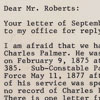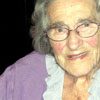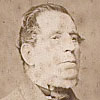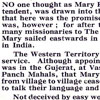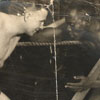Your Stories
Family Legends: Shadow or Substance? 30th July 2007
Family History
FAMILY LEGENDS: SHADOW OR SUBSTANCE?
by
David Roberts
Church House
3 Station Road
East Leake
Loughborough
Leics
LE12 6LQ
Tel 01509 852870
david@evanroberts.fsbusiness.co.uk
FAMILY LEGENDS: SHADOW OR SUBSTANCE?
There is no such thing as an ‘ordinary’ family any more than there might be ‘ordinary’ people. We all have our tales to tell as individuals. So it is with families.
Anyone who has reflected on their family history is sure to have wondered about the family stories and legends we all heard in our childhood. Who hasn’t heard seemingly far-fetched tales as a child – ones that you could scarcely believe even in your naïve, gullible years and which as an adult seem even more laughable?
For my own part, I heard plenty of them. I used to put them in the same category as much of the wearisome, homespun ‘truths’, with which my generation were frequently regaled. “Listeners never hear any good of themselves”; “an apple a day…” etc. etc. Yeah, yeah, yeah. Very tedious to a small child, although in later years one can look back at them, and see a glimmer – just a glimmer mind you – of truth.
As a child I recall asking my grandmother (b 1870) about the family history. I would say – “…and where did he come from?” “…and where did his father come from?” In common with most readers perhaps, how I wish I had pursued this line of enquiry even further. Maybe I did: memory makes fools of us all.
An early recollection was that of being told that Charles, one of my grandfather’s brothers, joined the North West Mounted Police, later to become the Royal Canadian Mounted Police. I may have been sceptical because my grandfather (b 1857) never mentioned it. It was my mother who did so. The difference is simply that my mother is a romantic at heart (I use the present tense because she is now 100 years old), and I was aware of this characteristic even as a small child. So I never fully believed the RCMP story. To add further to my scepticism, I was told that he went to Canada having been expelled from his school for striking and knocking out a teacher who was apparently bullying one of his brothers. To a somewhat shy schoolboy as I then was, striking a teacher was something I could barely contemplate. That did not prevent me from being excited by the thought of someone going to Canada and joining the Mounties. And it did hold some credence: my great-grandfather was keen on boxing, and paid for each of his sons to have lessons. So perhaps Charles really did give an over-enthusiastic uppercut to his teacher.
My father (b 1903) was away during the war and I was sure that scraps of information about him from my mother had been honed and exaggerated. Therefore when I heard that he had been a wrestler as well as a footballer, oarsman, and boxer, I took it with more than a pinch of salt. To make it even more unbelievable, I was told that he had wrestled and had beaten a man called Black Butcher Johnson. “He was a black man,” said my mother unnecessarily. In those racially naïve days, I had never seen a black man. I had heard of them, but none lived anywhere near us. They were in Africa, or somewhere like that, and I dismissed as ridiculous the notion that my father could have actually wrestled one. He hadn’t even been to Africa.
My father’s family were mysterious. Mother had never met any of them, although there were vague tales of a there being a sister and two brothers, one in Bombay. My paternal grandfather (b1875) was alleged to have been physically tough, and a disciplinarian. He was a cavalryman in the First World War and his horse had been blown away from beneath him, leaving him, well, at a disadvantage. But by then he had fathered five children.
I recall hearing about a cousin’s funeral. She was in a branch of the family with whom we had little contact but I was told that they were strong Salvationists and that one of them was a missionary. Again, bearing in mind my mother’s fanciful nature, I found this difficult to believe. My knowledge of The Salvation Army was limited to a local hall where they screened Chaplin and Buster Keaton films on wet Saturday afternoons. Admission was one penny. As for missionaries...well they were usually eaten weren’t they? So I soon dismissed this notion.
Mother said my great grandfather (b 1817) had walked from Langley Burrell, Chippenham, to London. I have since established that in 1845 he worked as a cheesemonger at 37 Kingsgate in Central London. Later, he opened his first butcher’s shop at 151 Drury Lane. As a child, I frequently had to accompany my grandmother (b 1870) to the local Sainsbury’s. She would not shop anywhere else. It had a reputation for hygiene. There was a sparkling mosaic floor sprinkled with fresh sawdust, seemingly ice-cold marble counter tops, and the smells of bacon, cheese, meat and ham, combined to produce an aroma that even now I can recreate at will. Apart from this, was there another reason for grandma’s unflinching loyalty? I was told that my great grandmother (b 1827) and Mrs Sainsbury were close friends and used to chat when they were closing the blinds at the end of the day’s business in Drury Lane. So she knew Mrs Sainsbury? Oh, yeah. Of course.
My great grandfather’s widowed mother had remarried to a man who was always referred to as a ‘gentleman smuggler’ and was prone to terrible rages during which he lit cigars with £5 notes. Even at the age of eight or nine, I couldn’t help thinking “What an idiot!” As with the other tales, I didn’t believe it, but the smuggler bit fascinated me.
Another of these unlikely family stories concerned an unmarried great uncle who had a very unhappy love affair and was sent to Russia for a year on doctor’s advice to recuperate. Why Russia? Why not Bognor, or Bournemouth, or even Belgium? It’d be a lot cheaper.
So what of these legends? Was it all a load of nonsense compiled by my mother’s over-imaginative mind?
Well, I have to say that in my mature years I have verified some of it.
Soon after I started on the family history I decided to challenge The Mounties anecdote. I wrote to the RCMP, and had a reply from Ottawa almost by return of post. Yes, Charles Palmer had served at Fort McLeod, a North West Mounted Police stronghold. I was given the dates of his joining and of his discharge together with a booklet on the early history of the NWMP. It seems that around the time that Charles joined the Force, morale was low. Two men had been caught in a sudden blizzard and were found frozen to death; several had deserted; there was much illness, and some roofs of the living quarters had collapsed. To make matters worse, the men had not been paid for months. All this stirred my imagination and of course I had to see Fort McLeod. So I did. Always go back to primary sources.
Did my father ever wrestle the dreaded Black Butcher Johnson? Well, I do now have a photograph of one of his brothers (also a wrestler) striking a pose with a gentleman who certainly was not native to this country, so I have to give mother the benefit of the doubt.
And the cavalryman? I have discovered an old photograph of my paternal grandfather sitting astride a horse. It is of poor quality and I am unable to identify any insignia on his uniform that might indicate a regiment. I think there is a slight smile on his face, so presumably it was taken whilst his genitals were in tact.
Around 1980 I came across the order of service for the funeral of Brigadier Mary Ann Palmer (first cousin once removed), who was a missionary in India. With the same impulsiveness that was later to serve me well with the RCMP story, I telephoned the Salvation Army Headquarters in London. “Yes,” they said, “She was a missionary in India.” They gave me the name and telephone number of a high-ranking officer who had served with her in India. Apparently my cousin spoke the local dialect fluently, had a great sense of humour but was also a strong disciplinarian. Her very close friend, who could have told me so much more, had died the previous year.
And what about the relative who was sent to Russia? I’m not sure, but in a completely separate anecdote my mother told of another relative who was ‘in the employ of the Tsar of Russia’. “Yes,” I used to tease her, “Clearing the snow away, most likely.” She was not amused. My mother never seemed to connect this anecdote with the one about unrequited love, but it seems certain that there would have been a connection. I have tried to track the family name in St Petersburg without success. So far.
Alas, I have made no progress about the ‘gentleman smuggler’, and I have not being able to find any record of his marriage or death. I’d love to know how he came by those £5 notes. Forged them, perhaps.
With the Sainsbury story, I know that Sainsbury’s first shop was at 173 Drury Lane, a poor area in those days. My great grandfather was at 151 and later at 163. When I walked down Drury Lane some years ago, 173 and 163 did not seem to be very close together, but then I discovered that, unsurprisingly the numbering had changed in the intervening 125 years.
The Sainsbury name has cropped up many times in my researches. A Rev. Sainsbury officiated at a family marriage in Langley Burrell, Chippenham. Another Sainsbury had connections with the private school at Beckington, near Frome, scene of the possible uppercut that felled the hapless teacher. (And why would someone living in Drury Lane, send all his sons to a school so far away, if there were no familial or social connections?)
Finally, a little enigma.
I had a great uncle called Alfred Palmer. Quite an ordinary name, isn’t it? Except that his birth certificate describes him as Alfred D’Alvaetio Palmer. And his Death Certificate describes him as Alfred del Veccio Palmer. Now why would a parent name a child thus? Was Alfred the product of a liaison dangereuse? I have established that there was an Italian community in Holborn, not far from the Palmer shop. And my mother had been told that there was Spanish or Italian blood in the family. Another family legend that I never believed. (But she has had very black hair until the last few years.)
My wife and I have recently taken a holiday in Italy. Sitting in a gelatierra (ice cream parlour) I tried my hand at a few words snatched from an Italian phrase book. I must have made a decent fist of it, because the owner looked at my dark hair, darkish eyes. He became animated. “ Parents - Italiano?” he said. “You - Italiano parents?”
I smiled.
“I don’t know,” I said. “I just don’t know. There was a sort of rumour at one point…but … well, you know what rubbish family stories are.”
by
David Roberts
Church House
3 Station Road
East Leake
Loughborough
Leics
LE12 6LQ
Tel 01509 852870
david@evanroberts.fsbusiness.co.uk
FAMILY LEGENDS: SHADOW OR SUBSTANCE?
There is no such thing as an ‘ordinary’ family any more than there might be ‘ordinary’ people. We all have our tales to tell as individuals. So it is with families.
Anyone who has reflected on their family history is sure to have wondered about the family stories and legends we all heard in our childhood. Who hasn’t heard seemingly far-fetched tales as a child – ones that you could scarcely believe even in your naïve, gullible years and which as an adult seem even more laughable?
For my own part, I heard plenty of them. I used to put them in the same category as much of the wearisome, homespun ‘truths’, with which my generation were frequently regaled. “Listeners never hear any good of themselves”; “an apple a day…” etc. etc. Yeah, yeah, yeah. Very tedious to a small child, although in later years one can look back at them, and see a glimmer – just a glimmer mind you – of truth.
As a child I recall asking my grandmother (b 1870) about the family history. I would say – “…and where did he come from?” “…and where did his father come from?” In common with most readers perhaps, how I wish I had pursued this line of enquiry even further. Maybe I did: memory makes fools of us all.
An early recollection was that of being told that Charles, one of my grandfather’s brothers, joined the North West Mounted Police, later to become the Royal Canadian Mounted Police. I may have been sceptical because my grandfather (b 1857) never mentioned it. It was my mother who did so. The difference is simply that my mother is a romantic at heart (I use the present tense because she is now 100 years old), and I was aware of this characteristic even as a small child. So I never fully believed the RCMP story. To add further to my scepticism, I was told that he went to Canada having been expelled from his school for striking and knocking out a teacher who was apparently bullying one of his brothers. To a somewhat shy schoolboy as I then was, striking a teacher was something I could barely contemplate. That did not prevent me from being excited by the thought of someone going to Canada and joining the Mounties. And it did hold some credence: my great-grandfather was keen on boxing, and paid for each of his sons to have lessons. So perhaps Charles really did give an over-enthusiastic uppercut to his teacher.
My father (b 1903) was away during the war and I was sure that scraps of information about him from my mother had been honed and exaggerated. Therefore when I heard that he had been a wrestler as well as a footballer, oarsman, and boxer, I took it with more than a pinch of salt. To make it even more unbelievable, I was told that he had wrestled and had beaten a man called Black Butcher Johnson. “He was a black man,” said my mother unnecessarily. In those racially naïve days, I had never seen a black man. I had heard of them, but none lived anywhere near us. They were in Africa, or somewhere like that, and I dismissed as ridiculous the notion that my father could have actually wrestled one. He hadn’t even been to Africa.
My father’s family were mysterious. Mother had never met any of them, although there were vague tales of a there being a sister and two brothers, one in Bombay. My paternal grandfather (b1875) was alleged to have been physically tough, and a disciplinarian. He was a cavalryman in the First World War and his horse had been blown away from beneath him, leaving him, well, at a disadvantage. But by then he had fathered five children.
I recall hearing about a cousin’s funeral. She was in a branch of the family with whom we had little contact but I was told that they were strong Salvationists and that one of them was a missionary. Again, bearing in mind my mother’s fanciful nature, I found this difficult to believe. My knowledge of The Salvation Army was limited to a local hall where they screened Chaplin and Buster Keaton films on wet Saturday afternoons. Admission was one penny. As for missionaries...well they were usually eaten weren’t they? So I soon dismissed this notion.
Mother said my great grandfather (b 1817) had walked from Langley Burrell, Chippenham, to London. I have since established that in 1845 he worked as a cheesemonger at 37 Kingsgate in Central London. Later, he opened his first butcher’s shop at 151 Drury Lane. As a child, I frequently had to accompany my grandmother (b 1870) to the local Sainsbury’s. She would not shop anywhere else. It had a reputation for hygiene. There was a sparkling mosaic floor sprinkled with fresh sawdust, seemingly ice-cold marble counter tops, and the smells of bacon, cheese, meat and ham, combined to produce an aroma that even now I can recreate at will. Apart from this, was there another reason for grandma’s unflinching loyalty? I was told that my great grandmother (b 1827) and Mrs Sainsbury were close friends and used to chat when they were closing the blinds at the end of the day’s business in Drury Lane. So she knew Mrs Sainsbury? Oh, yeah. Of course.
My great grandfather’s widowed mother had remarried to a man who was always referred to as a ‘gentleman smuggler’ and was prone to terrible rages during which he lit cigars with £5 notes. Even at the age of eight or nine, I couldn’t help thinking “What an idiot!” As with the other tales, I didn’t believe it, but the smuggler bit fascinated me.
Another of these unlikely family stories concerned an unmarried great uncle who had a very unhappy love affair and was sent to Russia for a year on doctor’s advice to recuperate. Why Russia? Why not Bognor, or Bournemouth, or even Belgium? It’d be a lot cheaper.
So what of these legends? Was it all a load of nonsense compiled by my mother’s over-imaginative mind?
Well, I have to say that in my mature years I have verified some of it.
Soon after I started on the family history I decided to challenge The Mounties anecdote. I wrote to the RCMP, and had a reply from Ottawa almost by return of post. Yes, Charles Palmer had served at Fort McLeod, a North West Mounted Police stronghold. I was given the dates of his joining and of his discharge together with a booklet on the early history of the NWMP. It seems that around the time that Charles joined the Force, morale was low. Two men had been caught in a sudden blizzard and were found frozen to death; several had deserted; there was much illness, and some roofs of the living quarters had collapsed. To make matters worse, the men had not been paid for months. All this stirred my imagination and of course I had to see Fort McLeod. So I did. Always go back to primary sources.
Did my father ever wrestle the dreaded Black Butcher Johnson? Well, I do now have a photograph of one of his brothers (also a wrestler) striking a pose with a gentleman who certainly was not native to this country, so I have to give mother the benefit of the doubt.
And the cavalryman? I have discovered an old photograph of my paternal grandfather sitting astride a horse. It is of poor quality and I am unable to identify any insignia on his uniform that might indicate a regiment. I think there is a slight smile on his face, so presumably it was taken whilst his genitals were in tact.
Around 1980 I came across the order of service for the funeral of Brigadier Mary Ann Palmer (first cousin once removed), who was a missionary in India. With the same impulsiveness that was later to serve me well with the RCMP story, I telephoned the Salvation Army Headquarters in London. “Yes,” they said, “She was a missionary in India.” They gave me the name and telephone number of a high-ranking officer who had served with her in India. Apparently my cousin spoke the local dialect fluently, had a great sense of humour but was also a strong disciplinarian. Her very close friend, who could have told me so much more, had died the previous year.
And what about the relative who was sent to Russia? I’m not sure, but in a completely separate anecdote my mother told of another relative who was ‘in the employ of the Tsar of Russia’. “Yes,” I used to tease her, “Clearing the snow away, most likely.” She was not amused. My mother never seemed to connect this anecdote with the one about unrequited love, but it seems certain that there would have been a connection. I have tried to track the family name in St Petersburg without success. So far.
Alas, I have made no progress about the ‘gentleman smuggler’, and I have not being able to find any record of his marriage or death. I’d love to know how he came by those £5 notes. Forged them, perhaps.
With the Sainsbury story, I know that Sainsbury’s first shop was at 173 Drury Lane, a poor area in those days. My great grandfather was at 151 and later at 163. When I walked down Drury Lane some years ago, 173 and 163 did not seem to be very close together, but then I discovered that, unsurprisingly the numbering had changed in the intervening 125 years.
The Sainsbury name has cropped up many times in my researches. A Rev. Sainsbury officiated at a family marriage in Langley Burrell, Chippenham. Another Sainsbury had connections with the private school at Beckington, near Frome, scene of the possible uppercut that felled the hapless teacher. (And why would someone living in Drury Lane, send all his sons to a school so far away, if there were no familial or social connections?)
Finally, a little enigma.
I had a great uncle called Alfred Palmer. Quite an ordinary name, isn’t it? Except that his birth certificate describes him as Alfred D’Alvaetio Palmer. And his Death Certificate describes him as Alfred del Veccio Palmer. Now why would a parent name a child thus? Was Alfred the product of a liaison dangereuse? I have established that there was an Italian community in Holborn, not far from the Palmer shop. And my mother had been told that there was Spanish or Italian blood in the family. Another family legend that I never believed. (But she has had very black hair until the last few years.)
My wife and I have recently taken a holiday in Italy. Sitting in a gelatierra (ice cream parlour) I tried my hand at a few words snatched from an Italian phrase book. I must have made a decent fist of it, because the owner looked at my dark hair, darkish eyes. He became animated. “ Parents - Italiano?” he said. “You - Italiano parents?”
I smiled.
“I don’t know,” I said. “I just don’t know. There was a sort of rumour at one point…but … well, you know what rubbish family stories are.”
David Roberts
